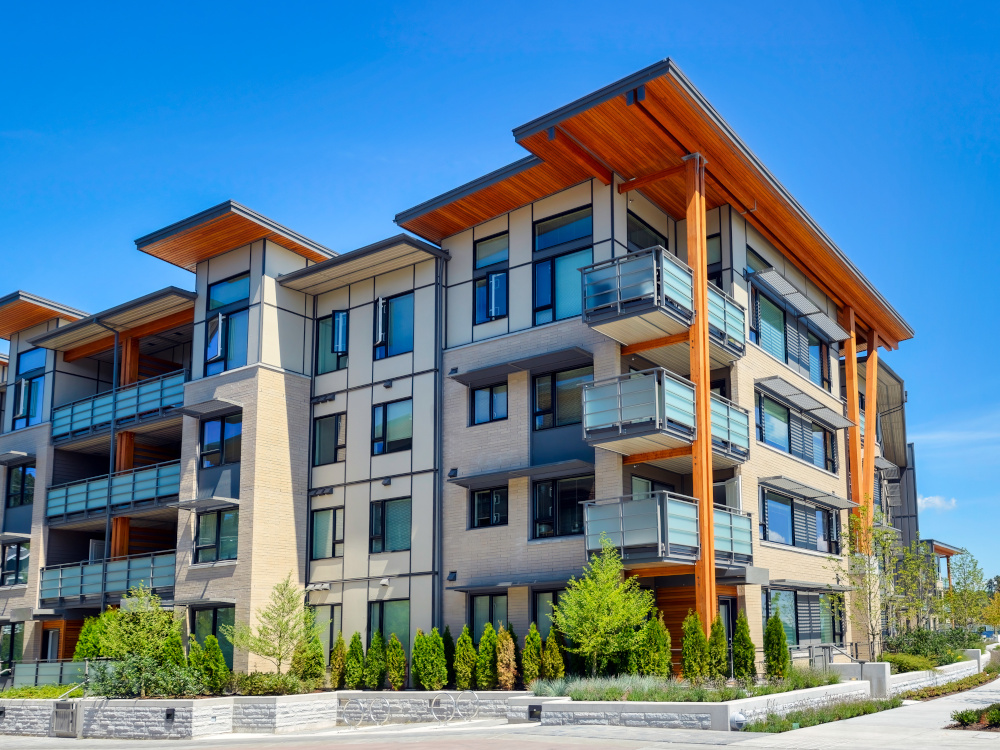This is the first in a series of articles in our Special Report on Real Estate in Canada and around the world. To see all the articles so far, click here.
Driven by demographic shifts, lower home affordability and government incentives, Canada’s purpose-built rental sector has seen a flurry of development and investor activity in recent years, especially amid a difficult condo market.
Although challenging economic conditions are giving some investors pause on purpose-built for now, especially in larger markets, the sector offers a compelling long-term story for many wealthy families interested in residential real estate.
The rise of purpose-built rentals
For years, the condo market was in favour with developers and investors, but it’s now under significant pressure.
Before 2022, condo developers operated in a market with low interest rates and high demand, with double-digit price growth in 2020 and 2021 in both Toronto and Vancouver, according to the Canada Mortgage and Housing Corporation (CMHC).
There’s certainly some demand there, it’s just the cost of construction is so crazy right now.
Shawn Oakley, KPMG
However, with higher interest rates increasing carrying costs and price growth stagnating, investors have been exiting the market.
In the first quarter of 2025, for example, the number of condominiums under construction in the GTA was at its lowest level since 2018, and sales of new units hit their lowest quarterly total in 30 years, a recent white paper from BILD and Urbanation notes.

Meanwhile, interest in purpose-built rentals—buildings designed for tenants—has been on the rise, driven not only by high demand for rental housing but by initiatives such as Canada’s National Housing Strategy and CMHC incentives for developers. In 2022 and 2023, rental housing starts surpassed 80,000 per year, according to RBC Economics, nearly doubling the average annual increases from 2015 to 2019.
Amid a pullback from condo investors, purpose-built rentals will contribute most of that new rental supply in the Greater Toronto Area over the next 10 years, says BILD, although the sector is also facing short-term headwinds.
The economics of purpose-built rentals
Historically, investors have approached purpose-built rentals and the condo market with different goals in mind, says Shawn Oakley, director, real estate advisory services, with KPMG Canada in Toronto.
“The difference between purpose-built rental and condo development is, with condo, you’re in and out in five years and then you take the money and you do another project,” he says.
“The purpose-built rental market is all about creating legacy wealth. You’re building wealth for your great-grandchildren,” he adds.
At the moment, however, the economics of building to either sell or rent is a challenge, Oakley says.
In the purpose-built rental market in particular, the CMHC expects slower population growth, changing employment conditions and reduced international migration targets to lead to a rise in supply and a decrease in rents year-over-year in several cities for the rest of 2025.
Indeed, lower rents and higher construction and operating costs, property taxes, insurance and heating expenses have created difficult conditions for purpose-built rental developers and investors in Toronto and Vancouver and a bit less so in Montreal and Calgary, says Oakley.

“When it’s all built, when it’s all rented, you’re making less profit on an annual basis than you were a few years ago,” he says. “There’s certainly some demand there, it’s just the cost of construction is so crazy right now.”
As a recent CMHC survey of rental construction market sentiment found, while the long-term perspective of Canadian rental housing developers is optimistic, four out of 10 have a negative outlook on the short-term feasibility of rental projects, citing challenges such as stricter lending criteria, flat revenue forecasts and significant upfront capital needs.
One emerging trend, says Oakley, is groups looking at more purpose-built rental in the single-family subdivision market, which some consider less risky.
Elsewhere, he says, some developers are starting projects today with the hope that, in five years, rents and profits will return to more traditional levels, but others are shying away for now.
In the midst of the challenging condo market, Zev Mandelbaum, president and CEO of Altree Developments in Toronto, is primarily focused on retirement, student rental and purpose-built rental in the GTA as well as in the United States, where it is more profitable to build these projects.
“It’s an essential need. For that, it’s more of an NOI [net operating income] play. Specifically, where we’re looking today, the markets are rewarding NOI much more than growth potential,” he says.
He expects the market and interest rates to stabilize, and confidence to slowly return into 2026, with the levels of condo inventory decreasing.
In the meantime, while Mandelbaum sees activity continuing in the purpose-built rental space, he notes that these builds can require triple the amount of equity of a condo development.
While CMHC initiatives do help—in 2024, the agency estimated that 88 per cent of purpose-built rental apartment starts were supported by its construction financing programs and mortgage loan insurance products— Mandelbaum says further changes, such as the lowering or elimination of development charges, for example, would make purpose-built rental projects more economical for some investors.
“Purpose-built rental’s a function of economics. It’s a pure function of what, economically, does the country need,” he says. “You don’t build a purpose-built rental because of an emotional decision. You build it because, frankly, you have a good business case to build it.”

Family office investment in purpose-built rentals
For families who are interested in investing in residential real estate, Jeff Noble, director, private wealth, with BDO Canada LLP in Mississauga, Ont., says purpose-built rentals are on the radar.
“We’re definitely getting a lot more inbound questions from our clients and customers about purpose-built rentals and how they can get involved in the market, no question about it,” he says.
Purpose-built rentals, says Noble, appeal to investors as a private, non-traditional asset class and, typically, a longer-term investment.
High-net-worth individuals have many ways to participate. While some single-family offices are investing directly alongside the developer or builder, he is also seeing more inquiries from wealthy families looking to invest as part of a fund. Others participate from a credit perspective, providing secured lending.
“Depending if that portfolio’s looking for diversification for risk management, or looking for something to generate what could be tax-efficient cash distributions, or looking for capital appreciation … the way it fits in the portfolio will be dependent on which of those three things that the investor’s trying to achieve,” he says.
Some investors are concerned that the purpose-built rental sector may find itself in a similar surplus situation like the condo market, but Noble says longer-term trends like housing affordability, demand for student accommodation and the cultural shift toward renting rather than owning are positive.
Indeed, while the market will remain in a period of adjustment as demand struggles to keep pace with new supply, says the CMHC, there is also “a need to maintain momentum in new rental supply to meet the needs of projected future population growth.”
Noble notes, “I think there is a growing interest in rental. If you want to be investing in residential real estate right now, it’s what’s out there.”
Helen Burnett-Nichols is a Hamilton, Ont.-based business and financial writer. For more than 20 years, she has covered investment, legal, wealth management, entrepreneurship, benefits and pensions, financial planning and personal finance topics for national and industry-focused publications. Prior to embarking on a freelance career, Helen held editorial roles in both Toronto and London, England.
Get our new quarterly newsletter about real estate: Canadian Family Offices’ new newsletter will bring you key insights, trends and expert perspectives. Click here to subscribe to stay ahead.
Please visit here to see information about our standards of journalistic excellence.




